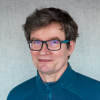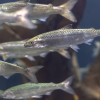Objectives
The overarching aim of the initiative is to generate knowledge and solutions for sustainable land-based and marine salmonid aquaculture in the Nordic countries. The initiative also aims to promote Responsible Research and Innovation (RRI) perspectives in sustainable aquaculture within a Nordic context including diversity, inclusion, openness and transparency.
Four crucial and inter-related areas of priority for a joint Nordic research and innovation initiative in sustainable salmonid aquaculture are identified.
1) Aquaculture microbiome systems
2) Aquaculture feeding systems
3) Biotechnological advances
4) Aquaculture "big data" monitoring and control systems.
Background
Aquaculture is a growing global business, which faces many facets of sustainability challenges, including careful management of effluents and waste, disease-related losses, the effect on greenhouse gas emission, and social acceptance.
As aquaculture gains an increasing global market, more light will be shed on its effect on greenhouse gas (GHG) emission. Aquaculture is contributing to the GHG load directly via the production of fish and crustaceans and indirectly via production, processing and logistics of particularly feed, but also end-products and waste. However, aquaculture offers a degree of climate resilience and elasticity, as it is mostly based on organisms feeding in the low end the food chain and in some cases even assist in carbon sequestration (seaweed, molluscs).
Social acceptance of aquaculture is not a given, albeit contributing to local growth and employment. Local communities, consumers and NGOs all question aquaculture production and the public sector need to stimulate aquaculture in new ways, adapting flexible regulation to future needs and requirements.
Funding and funding partners
The total initiative budget is approximately 82 million NOK.
Committee
The committee comprises representatives for the participating funding organisations:
- Kjell Maroni, R&D Director, Norwegian Seafood Research Fund (chair)
- Kolbrún Bjargmundsdóttir, Rannis, Iceland
- Orian Bondestam, the Ministry of Agriculture and Forestry in Finland
- Aila Lonka, Innovation Fund Denmark
- Inger Oline Røsvik, the Research Council of Norway
- Katrin Saar, the Estonian Research Council
- Edvards Francis Kuks, the Ministry of Education and Science of the Republic of Latvia
- Lisa Granelli, the Swedish Research Council Formas
- Annika Sølvara, Research Council Faroe Islands (observer)









